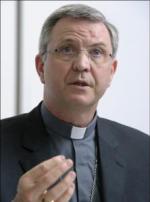12 Septembre 2011 16:00 | Künstlerhaus am Lenbachplatz, Festsaal
“LOCAL BELONGING, UNIVERSAL IDENTITIES” BY JOHAN BONNY

Comment on a parable:
He (Jesus) also said: “With what can we compare the kingdom of God, or what parable will we use for it? It is like a mustard seed, which, when sown upon the ground, is the smallest of all the seeds on earth; yet when it is sown it grows up and becomes the greatest of all shrubs, and puts forth large branches, so that the birds of the air can make nests in its shade. (Mc 4,30-32)
1. A tree cannot grow unless it is “rooted” in solid, fertile and fitting soil; an ‘identity’ cannot grow but from solid roots in a local, particular and coherent culture.
2. Peoples and nations have the right and the duty to make their own culture grow and flourish, for their own benefit and the benefit of others.
3. The parable rightly suggests that the purpose of growing into an identity cannot be limited to the principle of self-realisation only; self-realisation should transcend itself in hospitality.
4. Only when self-realisation opens up in hospitality, happiness becomes possible. Even the highest and biggest tree cannot sing; only the birds making their nest in its shadow can do so. Hospitality makes life different: for the three and for the birds.
5. The Gospel message is about the Kingdom of God and the “happiness” it brings forth. An open question: how can we present “hospitality”, in modern societies, as a way to greater happiness, for both the one who gives and the one who receives “hospitality”?
6. In “multicultural” cities and agglomerations: foster the possibility for different cultural groups to land and to make their own “nest”. They can bring new life into the “old” threes of our societies. They prepare the way to a larger and broader future for our own societies. They can take advantage of our cultural traditions.
7. A painful reality, hidden behind the well-mannered façade of our “multicultural” cities and agglomerations”: rootless persons and communities, who lost their own roots and do not succeed in making a new “nest”.
8. Civil authorities should be honoured and sustained in their efforts to keep the three of “local identity” healthy and stable. Hospitality can only be given in so far as the three remains firm and upright. We should try to understand why people and authorities in our major cities become worried about opening the doors too large and too easily.
9. Persons and groups of different cultural belongings should be sustained not only in “making a nest” but also in taking care of the three by which they are hosted. Hospitality and responsibility should go together.
10. Though hospitality is not intrinsically conditioned by reciprocity, it normally implies a similar invitation by the one who has been received. Hospitality receives its fulfilment in reciprocity (at least intentionally).
